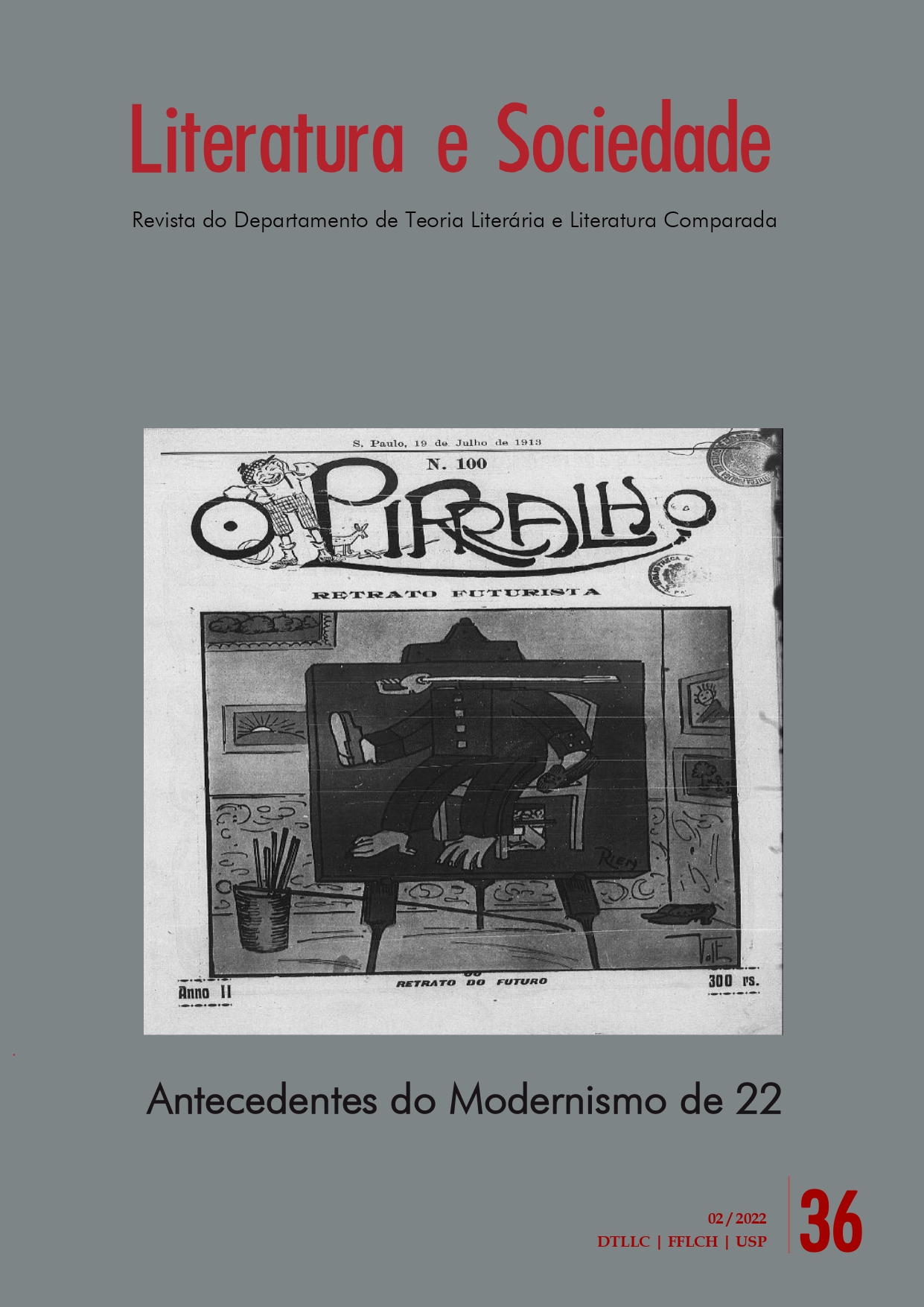O incontornável Corpo da Nação: reapropriações e heterodoxias futuristas em torno da Semana de Arte Moderna
DOI:
https://doi.org/10.11606/issn.2237-1184.v0i36p148-171Keywords:
Italian Futurism;, Modern Art Week, modernist poetryAbstract
Italian Futurism played a complex task, especially in the background of the São Paulo Art Week, but not exclusively. The article does not reconstruct so much
the polemic on Futurism that marked the gestation of the Week, but rather the differential role that Italian Futurism had as articulating material of a broader process that absorbed it in the preparation of the modernist aesthetic and ideological plot, even when its influence was not explicitly manifested.
Synthetically and by image, it could be said that a kind of negative conservation of values reconductible to Italian Futurism occurred. It means a conditioned reuse in the complexity of Brazil’s historical and social body showing how the external influence works only at the moment it becomes a force of internal transformation, as semiotics demonstrates. In this way the legacy of Futurism is noticed not only
in the inconveniences of the modern dawn but also in the dissemination that followed the impetuous emersion of the values of Modernism, in the refraction of multiple modernities.
Downloads
References
AGAMBEN, G. Il tempo che resta. Un commento alla Lettera ai Romani. Torino: Bollati Boringhieri, 2000, pp. 57-59.
ARRIGUCCI, JR., D. Humildade, paixão e morte. A poesia de Manuel Bandeira. São Paulo: Companhia das Letras, 1990.
Bandeira, M. Itinerário de Pasárgada. In: Poesia completa e prosa, 4ª ed. Rio de Janeiro: Nova Aguilar, 1990, p. 60.
CANDIDO, A. Literatura e cultura de 1900 a 1945. In: Literatura e sociedade. 6ª Ed. São Paulo: Ed. Nacional, 1980.
COPPOLA, Manuela. “Rented Spaces”: Italian Postcolonial Literature. Social Identities, 17 (1), 2011, p. 121-35.
BRITO DA SILVA, M. História do Modernismo brasileiro. Antecedentes da semana de arte moderna. 3ª Ed. Rio de Janeiro: Civilização Brasileira - MEC, 1971.
ANDRADE, Mário de. “A poesia em 1930”. In: Aspectos da literatura brasileira, cit., p. 291.
ANDRADE, Mário de. O movimento modernista. In: Aspectos da literatura brasileira. 5ª Ed. São Paulo: Martins, 1974.
Fimiani, M. L’arcaico e l’attuale. Lévy-Bruhl, Mauss, Foucault. Torino: Bollati Boringhieri, 2000.
FOOT HARDMAN, F. Algumas fantasias de Brasil: o modernismo paulista e a nova naturalidade da nação. In: Pelas margens. Outros caminhos da história e da literatura. SALVADORI DE DECCA, E. E LEMAIRE, R. (orgs.). Campinas-Porto Alegre: Unicamp-UFRGS, 2000.
LOMBARDI-DIOP, Cristina & romeo, Caterina. Italy's Postcolonial ‘Question’: Views from the Southern Frontier of Europe. In: Postcolonial Studies, 18 (4), 2015, p. 367-383.
MATHIAS, Dionei. “Literatura e fluxos migratórios em contextos anglófonos”: sobre agênese discursiva de um campo de pesquisa. Scripta Uniandrade, v. 16, n. 2, 2018, p. 225-38.
MATHIAS, Dionei. Neue alte Welt und altes neues Ich. Diffusion migrationsbedingter Identitätsentwürfe in veränderten kulturgeografischen Zusammenhängen. Eine Analyse zu Romanen von Andre Levy, Meera Syal, Diran Adebayo und Hanif Kureishi. Tréveris: Wissenschaftlicher Verlag Trier, 2011.
SCEGO, Igiaba. Adua. Trad. de Francesca Cricelli. São Paulo: Nós, 2018.
SCHWARZ, R. A carroça, o bonde e o poeta modernista. In: Que horas são?. São Paulo: Companhia das Letras, 1987.
STEGAGNO PICCHIO, L. Pessoa, Martinetti e il futurismo mentale della generazione dell’Orpheu. In: Il poeta e la finzione. Scritti su Fernando Pessoa, com curadoria de TABUCCHI, A. Genova: Tilgher, 1983.
VECCHI, R. A insustentável leveza do passado que não passa: sentimento e ressentimento do tempo dentro e fora do cânone modernista. In: Memória e (res)sentimento. Indagações sobre uma questão sensível. BRESCIANI, S.;
NAXARA, M. (orgs.). 2ª ed. Campinas: Unicamp, 2004.
VIRNO, P. I rompicapo del materialista. In: AA.VV. Il filosofo in borghes.Roma: Manifestolibri, 1992, p. 59.
VIRNO, Scienze sociali e “natura umana”. Facoltà di linguaggio, invariante biologico, rapporti di produzione. Soveria Mannelli: Rubettino, 2002.
VIVAN, Itala. “From AfricaMix to Babilonia”: The African Voice Writing Italian. The Global South, v. 5, n. 2, 2012, p. 121-38.
Downloads
Published
Issue
Section
License
Copyright (c) 2022 Literatura e Sociedade

This work is licensed under a Creative Commons Attribution-NonCommercial 4.0 International License.


